Legal Problem Solving Essay (200909) - Enterprise Law - SumA 2020
VerifiedAdded on 2022/08/28
|7
|1876
|22
Essay
AI Summary
This essay delves into key aspects of Enterprise Law, focusing on contract law principles, including offer and acceptance, and the postal rule, using a scenario involving a boat sale between Tom, Paul, and Sally to illustrate these concepts. It also examines undue influence and unconscionable conduct, providing a second scenario involving Mr. and Mrs. Rossi and Greg to illustrate misrepresentation and fraudulent practices in property transactions. The essay analyzes the legal implications of each scenario, referencing relevant Australian case law to support its arguments and determine the legal recourse available to the parties involved. It concludes by summarizing the findings and highlighting the legal outcomes based on the presented facts and legal principles.
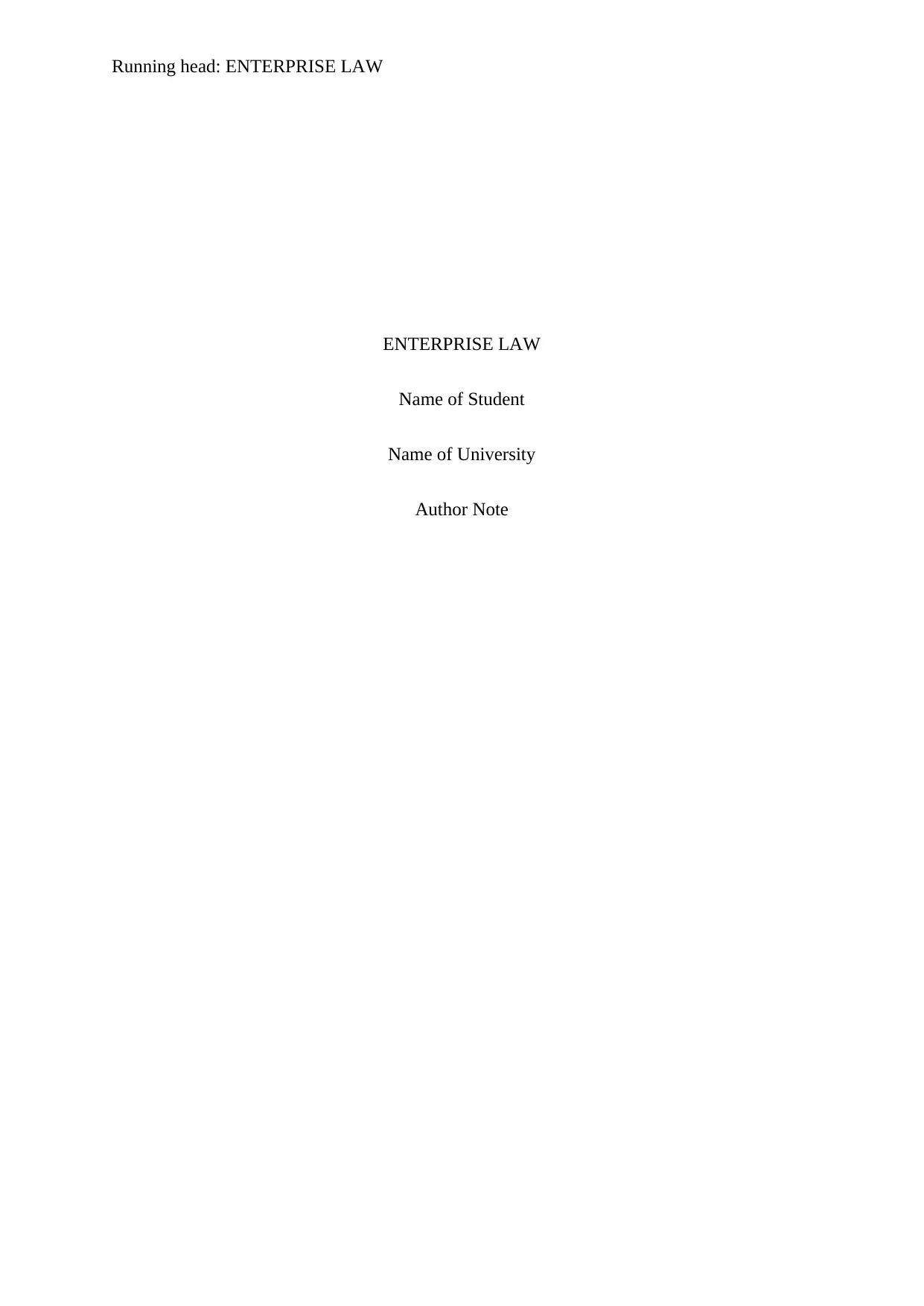
Running head: ENTERPRISE LAW
ENTERPRISE LAW
Name of Student
Name of University
Author Note
ENTERPRISE LAW
Name of Student
Name of University
Author Note
Paraphrase This Document
Need a fresh take? Get an instant paraphrase of this document with our AI Paraphraser
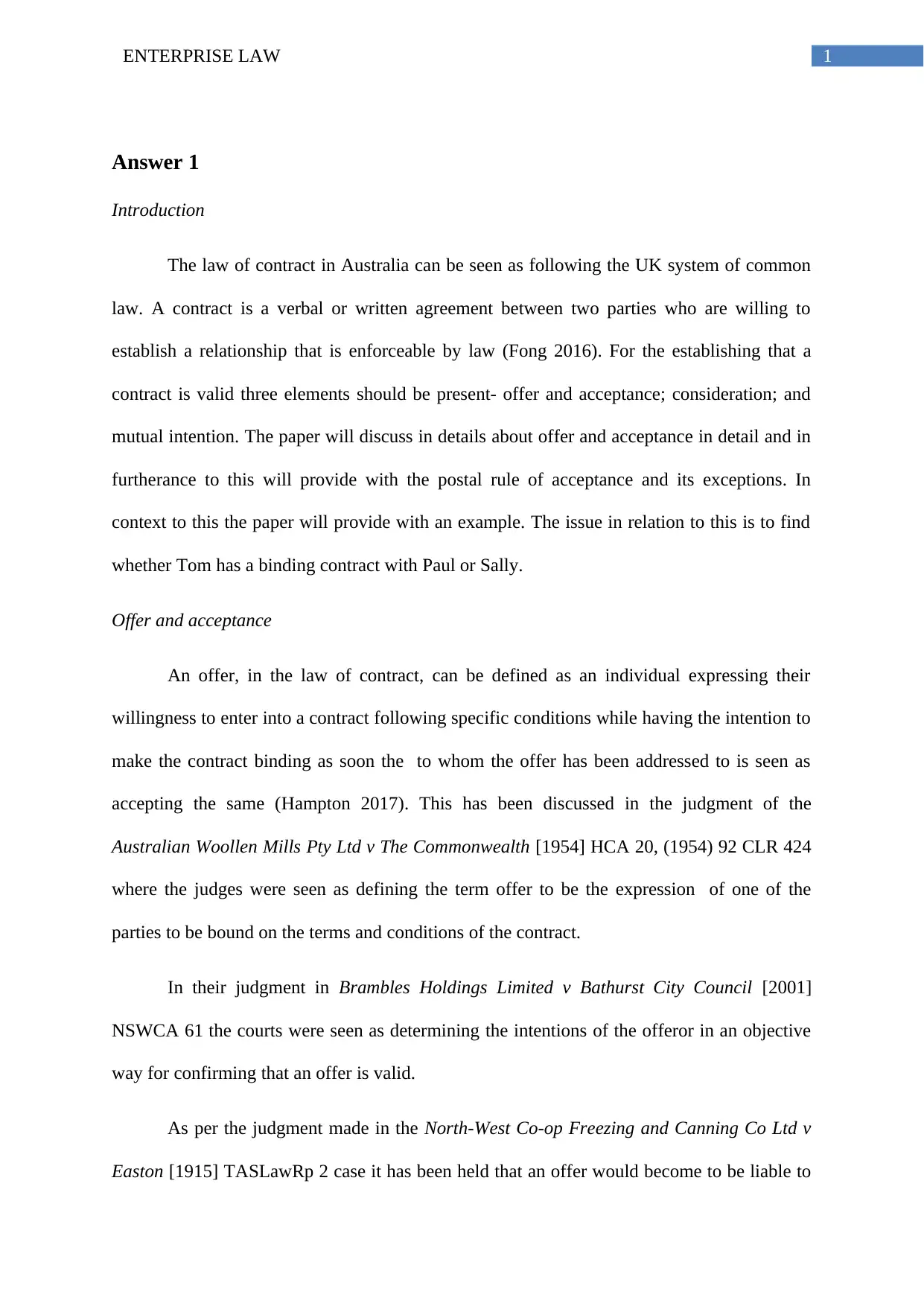
1ENTERPRISE LAW
Answer 1
Introduction
The law of contract in Australia can be seen as following the UK system of common
law. A contract is a verbal or written agreement between two parties who are willing to
establish a relationship that is enforceable by law (Fong 2016). For the establishing that a
contract is valid three elements should be present- offer and acceptance; consideration; and
mutual intention. The paper will discuss in details about offer and acceptance in detail and in
furtherance to this will provide with the postal rule of acceptance and its exceptions. In
context to this the paper will provide with an example. The issue in relation to this is to find
whether Tom has a binding contract with Paul or Sally.
Offer and acceptance
An offer, in the law of contract, can be defined as an individual expressing their
willingness to enter into a contract following specific conditions while having the intention to
make the contract binding as soon the to whom the offer has been addressed to is seen as
accepting the same (Hampton 2017). This has been discussed in the judgment of the
Australian Woollen Mills Pty Ltd v The Commonwealth [1954] HCA 20, (1954) 92 CLR 424
where the judges were seen as defining the term offer to be the expression of one of the
parties to be bound on the terms and conditions of the contract.
In their judgment in Brambles Holdings Limited v Bathurst City Council [2001]
NSWCA 61 the courts were seen as determining the intentions of the offeror in an objective
way for confirming that an offer is valid.
As per the judgment made in the North-West Co-op Freezing and Canning Co Ltd v
Easton [1915] TASLawRp 2 case it has been held that an offer would become to be liable to
Answer 1
Introduction
The law of contract in Australia can be seen as following the UK system of common
law. A contract is a verbal or written agreement between two parties who are willing to
establish a relationship that is enforceable by law (Fong 2016). For the establishing that a
contract is valid three elements should be present- offer and acceptance; consideration; and
mutual intention. The paper will discuss in details about offer and acceptance in detail and in
furtherance to this will provide with the postal rule of acceptance and its exceptions. In
context to this the paper will provide with an example. The issue in relation to this is to find
whether Tom has a binding contract with Paul or Sally.
Offer and acceptance
An offer, in the law of contract, can be defined as an individual expressing their
willingness to enter into a contract following specific conditions while having the intention to
make the contract binding as soon the to whom the offer has been addressed to is seen as
accepting the same (Hampton 2017). This has been discussed in the judgment of the
Australian Woollen Mills Pty Ltd v The Commonwealth [1954] HCA 20, (1954) 92 CLR 424
where the judges were seen as defining the term offer to be the expression of one of the
parties to be bound on the terms and conditions of the contract.
In their judgment in Brambles Holdings Limited v Bathurst City Council [2001]
NSWCA 61 the courts were seen as determining the intentions of the offeror in an objective
way for confirming that an offer is valid.
As per the judgment made in the North-West Co-op Freezing and Canning Co Ltd v
Easton [1915] TASLawRp 2 case it has been held that an offer would become to be liable to
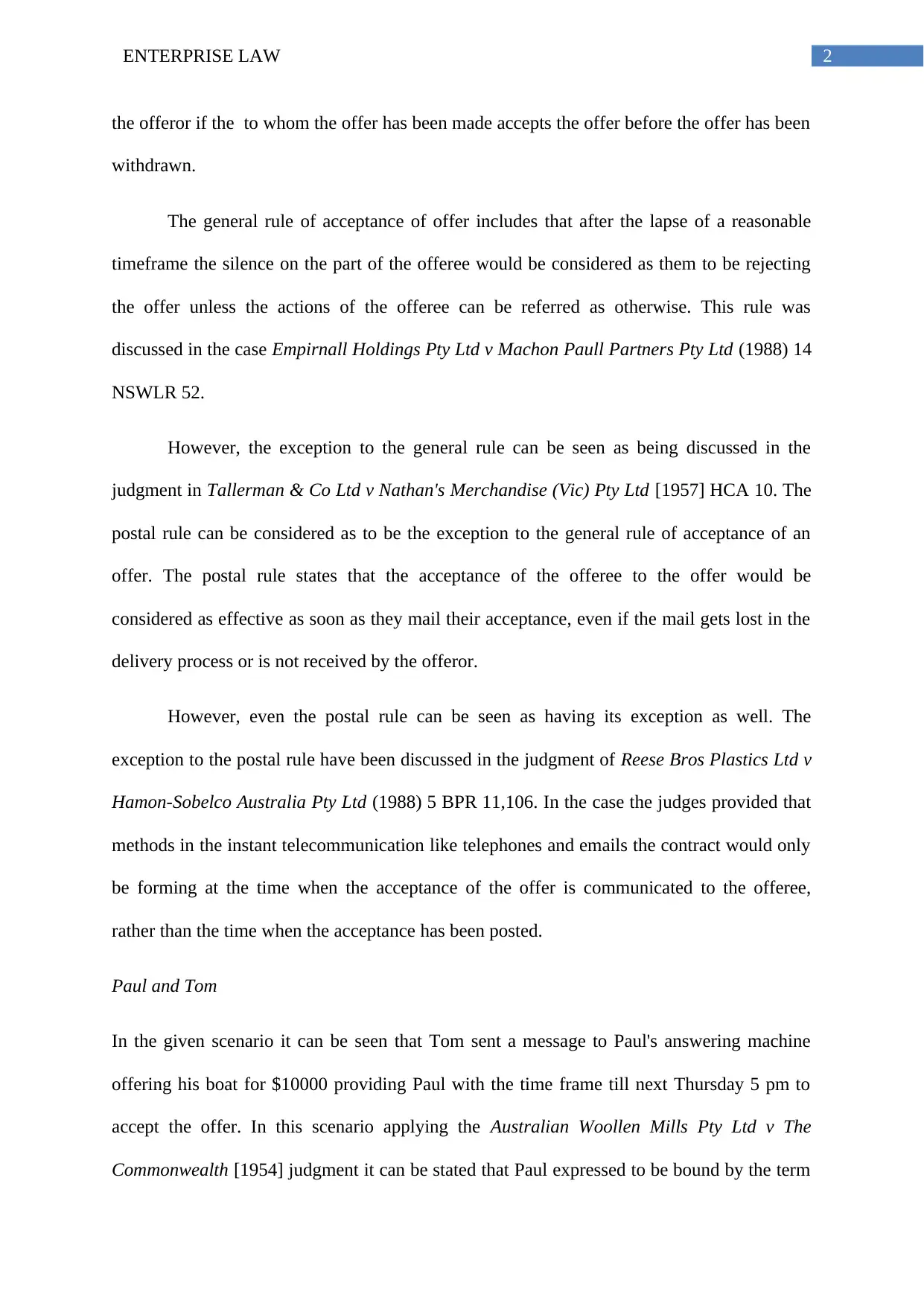
2ENTERPRISE LAW
the offeror if the to whom the offer has been made accepts the offer before the offer has been
withdrawn.
The general rule of acceptance of offer includes that after the lapse of a reasonable
timeframe the silence on the part of the offeree would be considered as them to be rejecting
the offer unless the actions of the offeree can be referred as otherwise. This rule was
discussed in the case Empirnall Holdings Pty Ltd v Machon Paull Partners Pty Ltd (1988) 14
NSWLR 52.
However, the exception to the general rule can be seen as being discussed in the
judgment in Tallerman & Co Ltd v Nathan's Merchandise (Vic) Pty Ltd [1957] HCA 10. The
postal rule can be considered as to be the exception to the general rule of acceptance of an
offer. The postal rule states that the acceptance of the offeree to the offer would be
considered as effective as soon as they mail their acceptance, even if the mail gets lost in the
delivery process or is not received by the offeror.
However, even the postal rule can be seen as having its exception as well. The
exception to the postal rule have been discussed in the judgment of Reese Bros Plastics Ltd v
Hamon-Sobelco Australia Pty Ltd (1988) 5 BPR 11,106. In the case the judges provided that
methods in the instant telecommunication like telephones and emails the contract would only
be forming at the time when the acceptance of the offer is communicated to the offeree,
rather than the time when the acceptance has been posted.
Paul and Tom
In the given scenario it can be seen that Tom sent a message to Paul's answering machine
offering his boat for $10000 providing Paul with the time frame till next Thursday 5 pm to
accept the offer. In this scenario applying the Australian Woollen Mills Pty Ltd v The
Commonwealth [1954] judgment it can be stated that Paul expressed to be bound by the term
the offeror if the to whom the offer has been made accepts the offer before the offer has been
withdrawn.
The general rule of acceptance of offer includes that after the lapse of a reasonable
timeframe the silence on the part of the offeree would be considered as them to be rejecting
the offer unless the actions of the offeree can be referred as otherwise. This rule was
discussed in the case Empirnall Holdings Pty Ltd v Machon Paull Partners Pty Ltd (1988) 14
NSWLR 52.
However, the exception to the general rule can be seen as being discussed in the
judgment in Tallerman & Co Ltd v Nathan's Merchandise (Vic) Pty Ltd [1957] HCA 10. The
postal rule can be considered as to be the exception to the general rule of acceptance of an
offer. The postal rule states that the acceptance of the offeree to the offer would be
considered as effective as soon as they mail their acceptance, even if the mail gets lost in the
delivery process or is not received by the offeror.
However, even the postal rule can be seen as having its exception as well. The
exception to the postal rule have been discussed in the judgment of Reese Bros Plastics Ltd v
Hamon-Sobelco Australia Pty Ltd (1988) 5 BPR 11,106. In the case the judges provided that
methods in the instant telecommunication like telephones and emails the contract would only
be forming at the time when the acceptance of the offer is communicated to the offeree,
rather than the time when the acceptance has been posted.
Paul and Tom
In the given scenario it can be seen that Tom sent a message to Paul's answering machine
offering his boat for $10000 providing Paul with the time frame till next Thursday 5 pm to
accept the offer. In this scenario applying the Australian Woollen Mills Pty Ltd v The
Commonwealth [1954] judgment it can be stated that Paul expressed to be bound by the term
⊘ This is a preview!⊘
Do you want full access?
Subscribe today to unlock all pages.

Trusted by 1+ million students worldwide
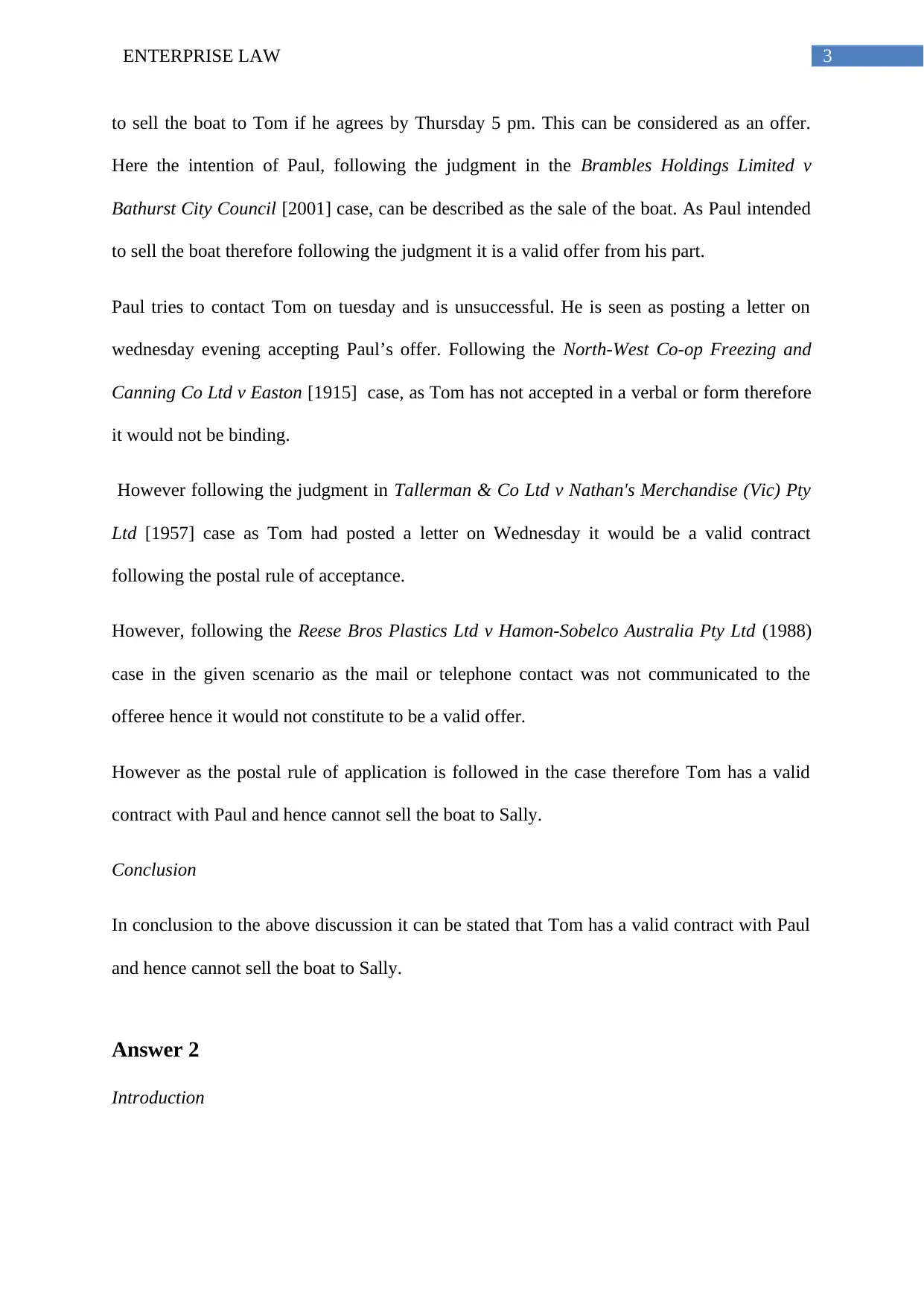
3ENTERPRISE LAW
to sell the boat to Tom if he agrees by Thursday 5 pm. This can be considered as an offer.
Here the intention of Paul, following the judgment in the Brambles Holdings Limited v
Bathurst City Council [2001] case, can be described as the sale of the boat. As Paul intended
to sell the boat therefore following the judgment it is a valid offer from his part.
Paul tries to contact Tom on tuesday and is unsuccessful. He is seen as posting a letter on
wednesday evening accepting Paul’s offer. Following the North-West Co-op Freezing and
Canning Co Ltd v Easton [1915] case, as Tom has not accepted in a verbal or form therefore
it would not be binding.
However following the judgment in Tallerman & Co Ltd v Nathan's Merchandise (Vic) Pty
Ltd [1957] case as Tom had posted a letter on Wednesday it would be a valid contract
following the postal rule of acceptance.
However, following the Reese Bros Plastics Ltd v Hamon-Sobelco Australia Pty Ltd (1988)
case in the given scenario as the mail or telephone contact was not communicated to the
offeree hence it would not constitute to be a valid offer.
However as the postal rule of application is followed in the case therefore Tom has a valid
contract with Paul and hence cannot sell the boat to Sally.
Conclusion
In conclusion to the above discussion it can be stated that Tom has a valid contract with Paul
and hence cannot sell the boat to Sally.
Answer 2
Introduction
to sell the boat to Tom if he agrees by Thursday 5 pm. This can be considered as an offer.
Here the intention of Paul, following the judgment in the Brambles Holdings Limited v
Bathurst City Council [2001] case, can be described as the sale of the boat. As Paul intended
to sell the boat therefore following the judgment it is a valid offer from his part.
Paul tries to contact Tom on tuesday and is unsuccessful. He is seen as posting a letter on
wednesday evening accepting Paul’s offer. Following the North-West Co-op Freezing and
Canning Co Ltd v Easton [1915] case, as Tom has not accepted in a verbal or form therefore
it would not be binding.
However following the judgment in Tallerman & Co Ltd v Nathan's Merchandise (Vic) Pty
Ltd [1957] case as Tom had posted a letter on Wednesday it would be a valid contract
following the postal rule of acceptance.
However, following the Reese Bros Plastics Ltd v Hamon-Sobelco Australia Pty Ltd (1988)
case in the given scenario as the mail or telephone contact was not communicated to the
offeree hence it would not constitute to be a valid offer.
However as the postal rule of application is followed in the case therefore Tom has a valid
contract with Paul and hence cannot sell the boat to Sally.
Conclusion
In conclusion to the above discussion it can be stated that Tom has a valid contract with Paul
and hence cannot sell the boat to Sally.
Answer 2
Introduction
Paraphrase This Document
Need a fresh take? Get an instant paraphrase of this document with our AI Paraphraser
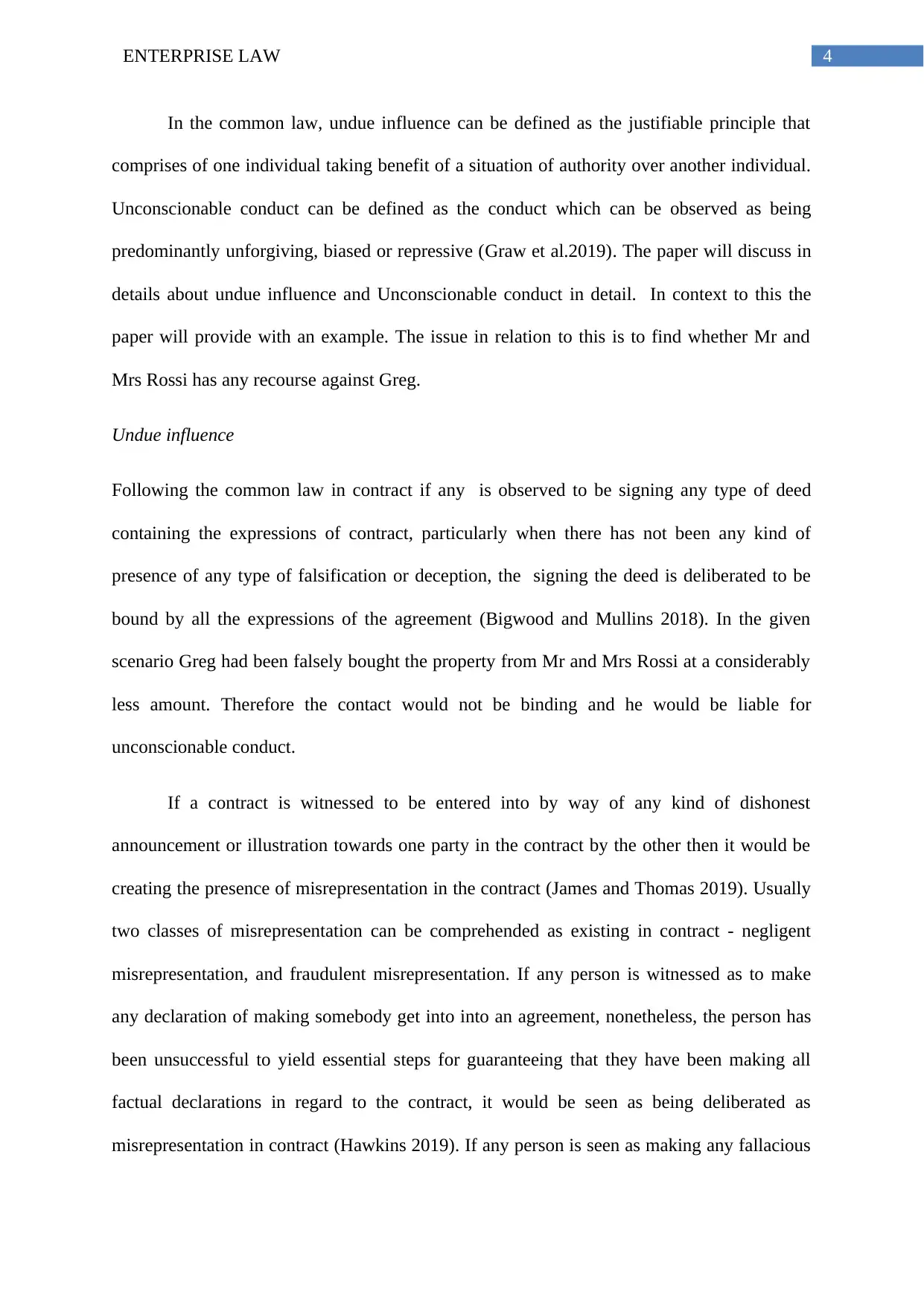
4ENTERPRISE LAW
In the common law, undue influence can be defined as the justifiable principle that
comprises of one individual taking benefit of a situation of authority over another individual.
Unconscionable conduct can be defined as the conduct which can be observed as being
predominantly unforgiving, biased or repressive (Graw et al.2019). The paper will discuss in
details about undue influence and Unconscionable conduct in detail. In context to this the
paper will provide with an example. The issue in relation to this is to find whether Mr and
Mrs Rossi has any recourse against Greg.
Undue influence
Following the common law in contract if any is observed to be signing any type of deed
containing the expressions of contract, particularly when there has not been any kind of
presence of any type of falsification or deception, the signing the deed is deliberated to be
bound by all the expressions of the agreement (Bigwood and Mullins 2018). In the given
scenario Greg had been falsely bought the property from Mr and Mrs Rossi at a considerably
less amount. Therefore the contact would not be binding and he would be liable for
unconscionable conduct.
If a contract is witnessed to be entered into by way of any kind of dishonest
announcement or illustration towards one party in the contract by the other then it would be
creating the presence of misrepresentation in the contract (James and Thomas 2019). Usually
two classes of misrepresentation can be comprehended as existing in contract - negligent
misrepresentation, and fraudulent misrepresentation. If any person is witnessed as to make
any declaration of making somebody get into into an agreement, nonetheless, the person has
been unsuccessful to yield essential steps for guaranteeing that they have been making all
factual declarations in regard to the contract, it would be seen as being deliberated as
misrepresentation in contract (Hawkins 2019). If any person is seen as making any fallacious
In the common law, undue influence can be defined as the justifiable principle that
comprises of one individual taking benefit of a situation of authority over another individual.
Unconscionable conduct can be defined as the conduct which can be observed as being
predominantly unforgiving, biased or repressive (Graw et al.2019). The paper will discuss in
details about undue influence and Unconscionable conduct in detail. In context to this the
paper will provide with an example. The issue in relation to this is to find whether Mr and
Mrs Rossi has any recourse against Greg.
Undue influence
Following the common law in contract if any is observed to be signing any type of deed
containing the expressions of contract, particularly when there has not been any kind of
presence of any type of falsification or deception, the signing the deed is deliberated to be
bound by all the expressions of the agreement (Bigwood and Mullins 2018). In the given
scenario Greg had been falsely bought the property from Mr and Mrs Rossi at a considerably
less amount. Therefore the contact would not be binding and he would be liable for
unconscionable conduct.
If a contract is witnessed to be entered into by way of any kind of dishonest
announcement or illustration towards one party in the contract by the other then it would be
creating the presence of misrepresentation in the contract (James and Thomas 2019). Usually
two classes of misrepresentation can be comprehended as existing in contract - negligent
misrepresentation, and fraudulent misrepresentation. If any person is witnessed as to make
any declaration of making somebody get into into an agreement, nonetheless, the person has
been unsuccessful to yield essential steps for guaranteeing that they have been making all
factual declarations in regard to the contract, it would be seen as being deliberated as
misrepresentation in contract (Hawkins 2019). If any person is seen as making any fallacious
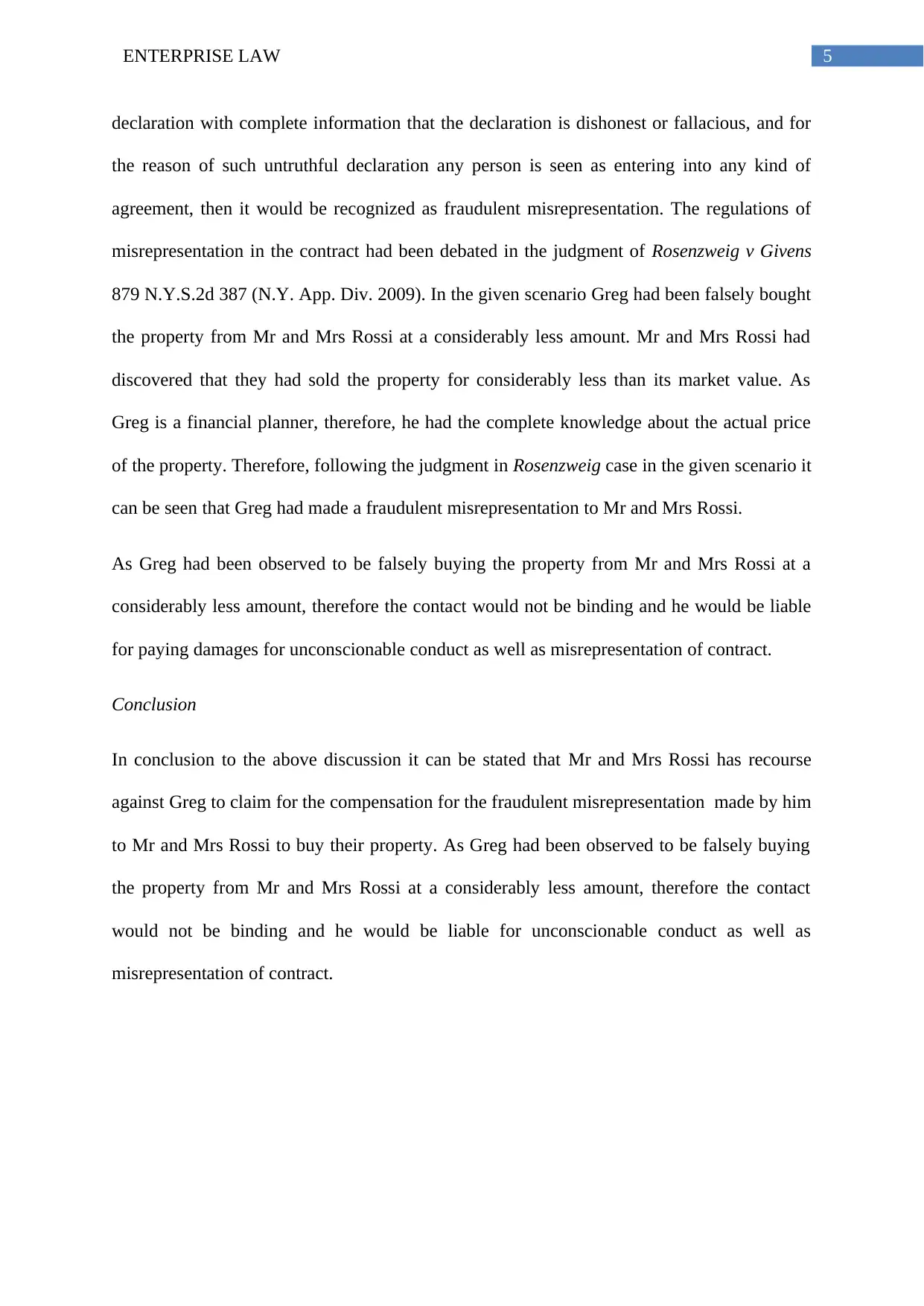
5ENTERPRISE LAW
declaration with complete information that the declaration is dishonest or fallacious, and for
the reason of such untruthful declaration any person is seen as entering into any kind of
agreement, then it would be recognized as fraudulent misrepresentation. The regulations of
misrepresentation in the contract had been debated in the judgment of Rosenzweig v Givens
879 N.Y.S.2d 387 (N.Y. App. Div. 2009). In the given scenario Greg had been falsely bought
the property from Mr and Mrs Rossi at a considerably less amount. Mr and Mrs Rossi had
discovered that they had sold the property for considerably less than its market value. As
Greg is a financial planner, therefore, he had the complete knowledge about the actual price
of the property. Therefore, following the judgment in Rosenzweig case in the given scenario it
can be seen that Greg had made a fraudulent misrepresentation to Mr and Mrs Rossi.
As Greg had been observed to be falsely buying the property from Mr and Mrs Rossi at a
considerably less amount, therefore the contact would not be binding and he would be liable
for paying damages for unconscionable conduct as well as misrepresentation of contract.
Conclusion
In conclusion to the above discussion it can be stated that Mr and Mrs Rossi has recourse
against Greg to claim for the compensation for the fraudulent misrepresentation made by him
to Mr and Mrs Rossi to buy their property. As Greg had been observed to be falsely buying
the property from Mr and Mrs Rossi at a considerably less amount, therefore the contact
would not be binding and he would be liable for unconscionable conduct as well as
misrepresentation of contract.
declaration with complete information that the declaration is dishonest or fallacious, and for
the reason of such untruthful declaration any person is seen as entering into any kind of
agreement, then it would be recognized as fraudulent misrepresentation. The regulations of
misrepresentation in the contract had been debated in the judgment of Rosenzweig v Givens
879 N.Y.S.2d 387 (N.Y. App. Div. 2009). In the given scenario Greg had been falsely bought
the property from Mr and Mrs Rossi at a considerably less amount. Mr and Mrs Rossi had
discovered that they had sold the property for considerably less than its market value. As
Greg is a financial planner, therefore, he had the complete knowledge about the actual price
of the property. Therefore, following the judgment in Rosenzweig case in the given scenario it
can be seen that Greg had made a fraudulent misrepresentation to Mr and Mrs Rossi.
As Greg had been observed to be falsely buying the property from Mr and Mrs Rossi at a
considerably less amount, therefore the contact would not be binding and he would be liable
for paying damages for unconscionable conduct as well as misrepresentation of contract.
Conclusion
In conclusion to the above discussion it can be stated that Mr and Mrs Rossi has recourse
against Greg to claim for the compensation for the fraudulent misrepresentation made by him
to Mr and Mrs Rossi to buy their property. As Greg had been observed to be falsely buying
the property from Mr and Mrs Rossi at a considerably less amount, therefore the contact
would not be binding and he would be liable for unconscionable conduct as well as
misrepresentation of contract.
⊘ This is a preview!⊘
Do you want full access?
Subscribe today to unlock all pages.

Trusted by 1+ million students worldwide
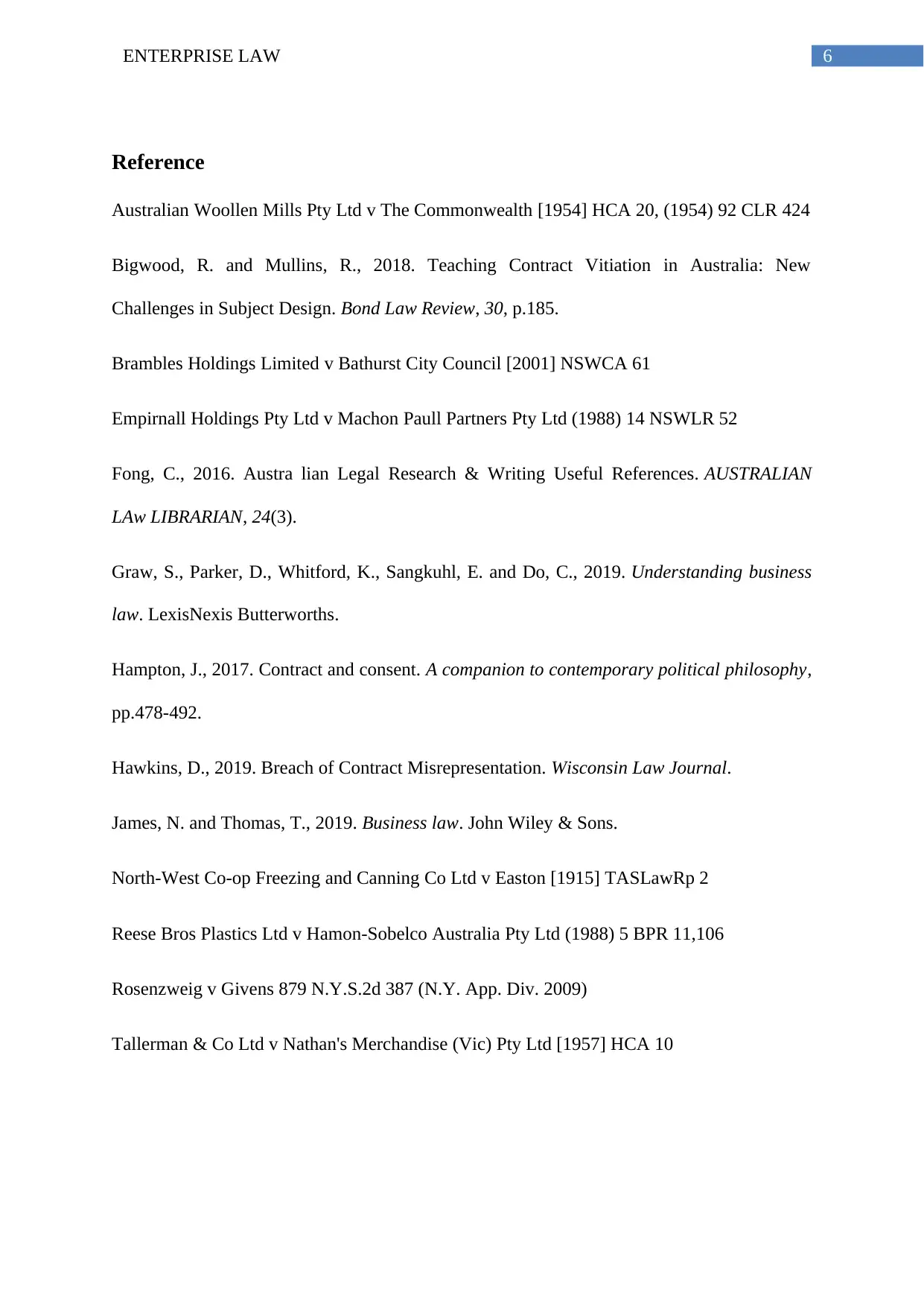
6ENTERPRISE LAW
Reference
Australian Woollen Mills Pty Ltd v The Commonwealth [1954] HCA 20, (1954) 92 CLR 424
Bigwood, R. and Mullins, R., 2018. Teaching Contract Vitiation in Australia: New
Challenges in Subject Design. Bond Law Review, 30, p.185.
Brambles Holdings Limited v Bathurst City Council [2001] NSWCA 61
Empirnall Holdings Pty Ltd v Machon Paull Partners Pty Ltd (1988) 14 NSWLR 52
Fong, C., 2016. Austra lian Legal Research & Writing Useful References. AUSTRALIAN
LAw LIBRARIAN, 24(3).
Graw, S., Parker, D., Whitford, K., Sangkuhl, E. and Do, C., 2019. Understanding business
law. LexisNexis Butterworths.
Hampton, J., 2017. Contract and consent. A companion to contemporary political philosophy,
pp.478-492.
Hawkins, D., 2019. Breach of Contract Misrepresentation. Wisconsin Law Journal.
James, N. and Thomas, T., 2019. Business law. John Wiley & Sons.
North-West Co-op Freezing and Canning Co Ltd v Easton [1915] TASLawRp 2
Reese Bros Plastics Ltd v Hamon-Sobelco Australia Pty Ltd (1988) 5 BPR 11,106
Rosenzweig v Givens 879 N.Y.S.2d 387 (N.Y. App. Div. 2009)
Tallerman & Co Ltd v Nathan's Merchandise (Vic) Pty Ltd [1957] HCA 10
Reference
Australian Woollen Mills Pty Ltd v The Commonwealth [1954] HCA 20, (1954) 92 CLR 424
Bigwood, R. and Mullins, R., 2018. Teaching Contract Vitiation in Australia: New
Challenges in Subject Design. Bond Law Review, 30, p.185.
Brambles Holdings Limited v Bathurst City Council [2001] NSWCA 61
Empirnall Holdings Pty Ltd v Machon Paull Partners Pty Ltd (1988) 14 NSWLR 52
Fong, C., 2016. Austra lian Legal Research & Writing Useful References. AUSTRALIAN
LAw LIBRARIAN, 24(3).
Graw, S., Parker, D., Whitford, K., Sangkuhl, E. and Do, C., 2019. Understanding business
law. LexisNexis Butterworths.
Hampton, J., 2017. Contract and consent. A companion to contemporary political philosophy,
pp.478-492.
Hawkins, D., 2019. Breach of Contract Misrepresentation. Wisconsin Law Journal.
James, N. and Thomas, T., 2019. Business law. John Wiley & Sons.
North-West Co-op Freezing and Canning Co Ltd v Easton [1915] TASLawRp 2
Reese Bros Plastics Ltd v Hamon-Sobelco Australia Pty Ltd (1988) 5 BPR 11,106
Rosenzweig v Givens 879 N.Y.S.2d 387 (N.Y. App. Div. 2009)
Tallerman & Co Ltd v Nathan's Merchandise (Vic) Pty Ltd [1957] HCA 10
1 out of 7
Related Documents
Your All-in-One AI-Powered Toolkit for Academic Success.
+13062052269
info@desklib.com
Available 24*7 on WhatsApp / Email
![[object Object]](/_next/static/media/star-bottom.7253800d.svg)
Unlock your academic potential
Copyright © 2020–2026 A2Z Services. All Rights Reserved. Developed and managed by ZUCOL.





